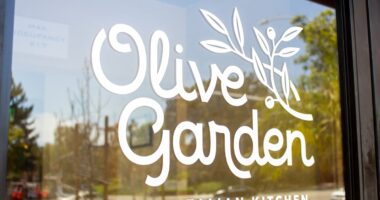In the aftermath of holiday indulgences, it’s natural to crave a more balanced, healthier lifestyle. While we certainly don’t discourage partaking in festivities and enjoying your favorite holiday treats and beverages, the season of indulgence can only last so long. The post-holiday period is a time to recommit to your fitness goals and focus once again on building and maintaining healthy habits. Therefore, if you’re curious about seamless ways to get fit after the holidays, you’ve come to the right place.
After weeks of festive gatherings and perhaps a few too many treats, transitioning back to a fitness-focused lifestyle can feel like a daunting task. Fortunately, that’s where we come in. We chatted with Michael Masi, CPT, a certified personal trainer at Garage Gym Reviews, who shares 10 seamless ways to get fit after the holidays.
Regardless of your fitness level, you’ll find at least a few nuggets of valuable advice in this comprehensive guide to reclaiming your fitness after the holidays. If you’re ready to shift gears and embrace a healthier, fitter you, keep reading for Masi’s 10 seamless ways to get fit after the holidays. And when you’re finished, don’t miss the 10 Best Breakfast Foods for Losing Weight & Gaining Muscle.
Eat a well-balanced diet.
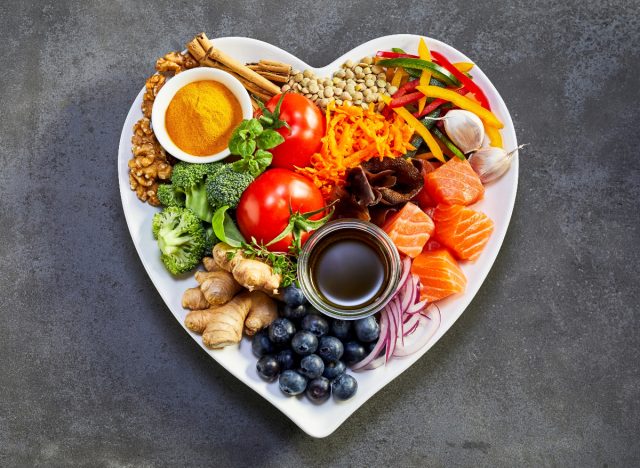
Returning to a well-balanced diet is a foundational step in your post-holiday fitness journey. Prioritize whole foods, lean proteins, fruits, and vegetables to nourish your body.
“Post-holiday fitness often begins with re-establishing your base diet,” Masi explains. “However, that doesn’t mean you need to crash diet. Opt for a balanced diet rich in fruits, vegetables, healthy fats, lean proteins, and whole grains. Reducing processed foods and sugars are simple ways to accomplish this without much food tracking being needed.”
Establish a regular exercise routine.
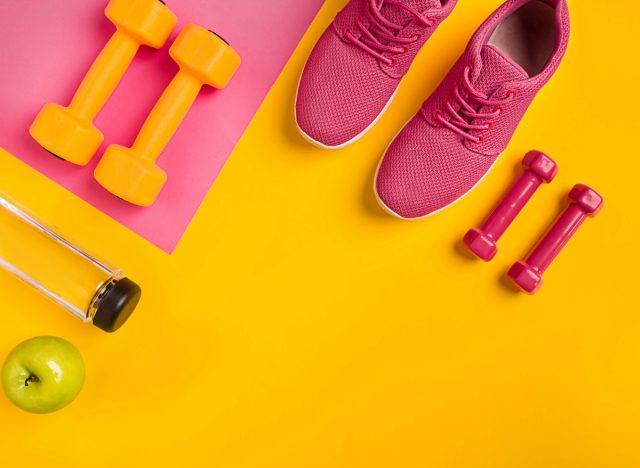
Consistency and fitness go hand in hand. Design a manageable exercise routine that you find enjoyable and fits your schedule. That’s the only way to build sustainable fitness habits.
“This approach is fundamental if you have not had this habit established before the holidays,” says Masi. “Your routine could include gym workouts, home exercises, or outdoor activities. Aim for at least 30 minutes of moderate activity most days of the week. If you had indulged over the holidays, this would be a great way to put those calories to use so they don’t get stored as body fat.”
Stay on top of hydration.
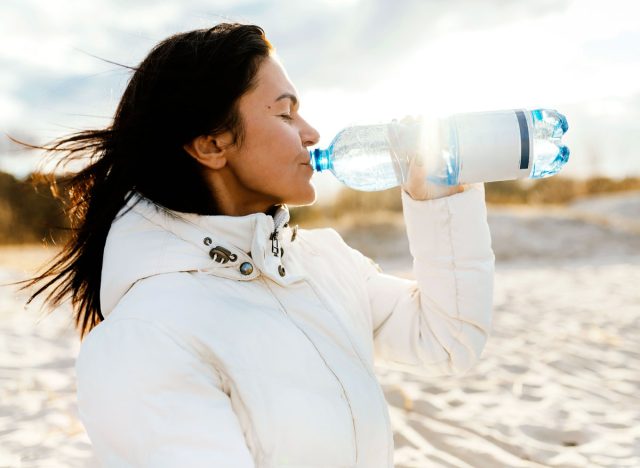
Drinking water is an essential pillar of well-being and fitness. That’s because staying hydrated boosts energy levels, aids digestion, and promotes recovery.
“Drinking plenty of water is crucial. It aids digestion, keeps you full, and can help reduce post-holiday bloat. This is even more impactful if you’re replacing sugary drinks or alcoholic beverages with water or even no-calorie drinks,” says Masi.
Get enough sleep.

Getting enough quality shuteye helps optimize your fitness efforts by supporting your body’s natural healing processes, boosting energy levels, and allowing you to exercise longer and harder.
“Good sleep helps regulate metabolism and repair muscles, especially important after workouts,” explains Msai. “This means re-establishing your bedtime routines to help you wind down before bed at the appropriate times. Also, if you’ve been going to bed significantly later than usual, try to ease your way back into your normal schedule by going to bed just a little earlier each night versus making a dramatic change per day.”
Set realistic, attainable goals.
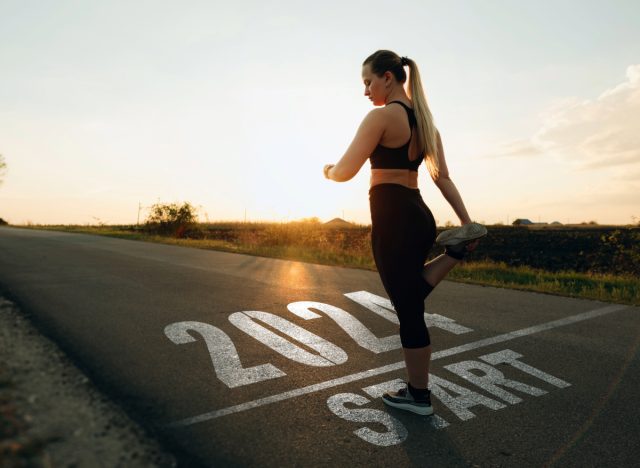
Whether completing a certain number of workouts per week or mastering a new exercise, realistic goals provide motivation and a sense of accomplishment to help keep you on track.
“Short-term goals can lead to long-term success and help maintain motivation. Fitness gives you some amazing acute benefits, but they don’t hold a candle to the benefits of long-term success. Remember, the key to getting fit is consistency, so start small, build on that foundation, choose exercises, and build habits you enjoy,” says Masi.
Practice yoga and meditation.
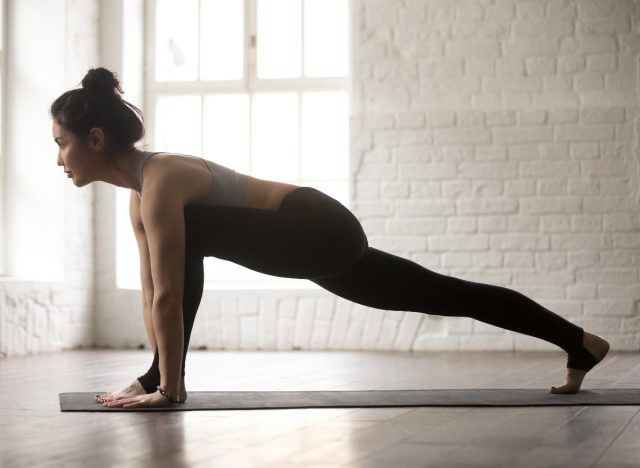
Holistic practices like yoga and meditation enhance flexibility and mindfulness and reduce stress, which can support physical and mental health and improve overall fitness.
“Returning to the real world filled with the normal expectations of adulting and work responsibility can be a shock after lounging around for a prolonged vacation,” states Masi. “Incorporate yoga or meditation for physical and mental wellness to help deal with the everyday burdens. It may help reduce stress and improve flexibility, mindfulness, and core strength.”
Incorporate high-intensity interval training (HIIT).
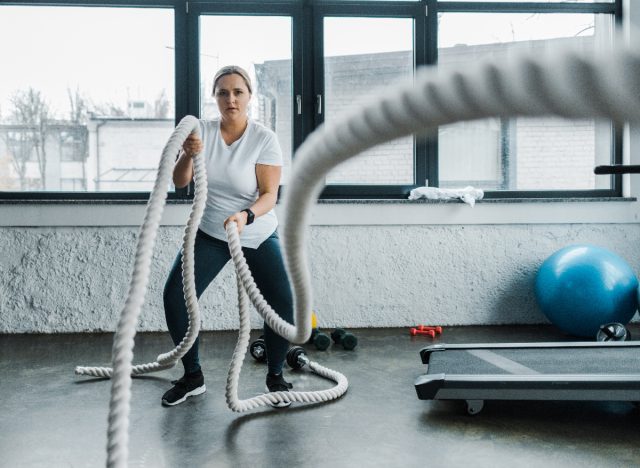
HIIT involves short bursts of intense activity followed by brief rest periods. These time-efficient and effective workouts can elevate your heart rate, boost metabolism, and contribute to fat loss, making them a valuable addition to your fitness routine.
Masi says, “HIIT workouts are effective for burning calories and improving cardiovascular health in a short amount of time. This is perfect for fitting in workouts when you have less time because you are still easing your way into your old sleep schedule. It also can be set up in fun ways that challenge what is important to you, whether that be cardiovascular fitness, muscular endurance, or the size of your biceps.”
Join a fitness class.
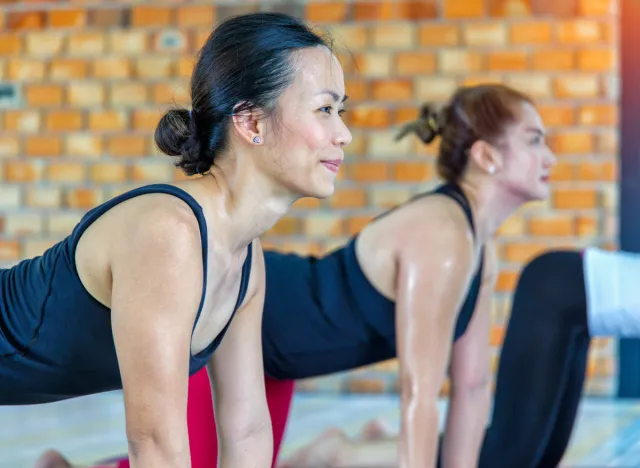
Group classes can help keep you accountable, making it much more likely you’ll reach your fitness goals. Whether it’s a dance class, spin class, or a group workout, classes offer structured guidance and a motivating environment.
“Group classes or fitness communities can provide motivation and support and often keep people successful for longer, as they can lean on others in the community for motivation or information. Activities like spinning, aerobics, CrossFit, or intramural sports are both fun and effective,” says Masi.
Limit alcohol and sugary drinks.

Reevaluate your beverage choices by limiting alcohol and sugary drinks. These options contain empty calories and added sugars that offer little nutritional value. Instead, choose water, herbal teas, or healthier alternatives to support your fitness goals and overall health.
“Reducing alcohol and sugary drink intake can significantly impact your calorie intake and overall health,” Masi elaborates. “Furthermore, alcohol should be seen as a stressor that the body has to recover from. This takes away from your body’s general ability to recover from workouts, which is further strained by a calorie deficit if you’re currently dieting. Just keep that in mind, and if you drink, do it in moderation.”
Track your progress.
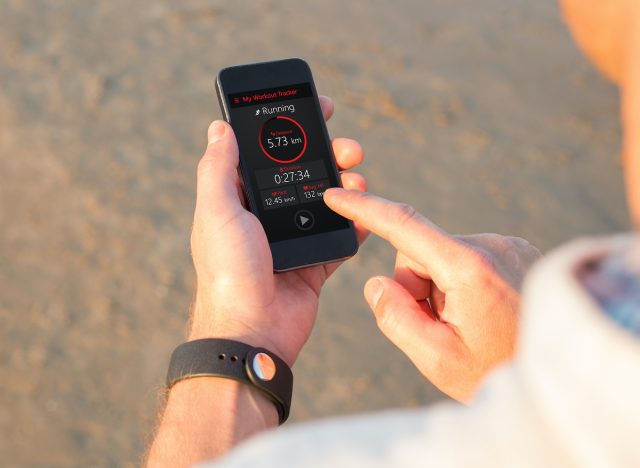
Track your progress using a fitness app, journal, or wearable device. These tools help you monitor achievements, big or small, providing motivation and insight into your improving fitness level.
“Keep a fitness journal or use a fitness app to track your progress. Even a simple food log can help make you more mindful of your choices and has been shown to help people lose weight, even without other interventions. Also, monitoring changes in your body and fitness level can be highly motivating,” explains Masi.


